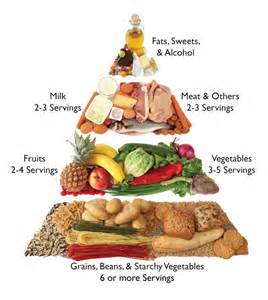Do Your Meals Provide The Proper Nutrition?
 What is a gluten free diet menu? Do you know how much nutrition a person who has been diagnosed with celiac disease or is allergic to gluten needs? This is where gluten free diet menus can help. As you know, individuals on a gluten free diet have difficulty in obtaining the proper nutrition from the foods they consume on a daily basis. As the meal planner for your family, it is your job to ensure that they do get the proper amounts of nutrition from the meals you prepare.
What is a gluten free diet menu? Do you know how much nutrition a person who has been diagnosed with celiac disease or is allergic to gluten needs? This is where gluten free diet menus can help. As you know, individuals on a gluten free diet have difficulty in obtaining the proper nutrition from the foods they consume on a daily basis. As the meal planner for your family, it is your job to ensure that they do get the proper amounts of nutrition from the meals you prepare.
Children, teens and adults whether they are on a gluten free diet or not, need to consume from the same basic food groups each day. This includes sufficient levels of vitamins, minerals and fiber.
The challenge for most meal planners have is for celiac disease and gluten sensitive persons. Most gluten free products purchased in the grocery store have less nutrition in them than their gluten counterparts. You must shop wisely to ensure that the foods you buy provide the best possible nutrition during the menu planning process.
Check out this video from Dr. Osborne on gluten sensitivities and nutritional deficiencies.
You will probably also notice that the prices for gluten free foods are more costlier than their gluten counterparts. However, more and more grocery stores are carrying gluten free products because the demand for these items have increased dramatically in the past few years and the prices for these products are starting to come down.
Gluten Free Diet Mistake #1 Video
Before you begin to plan the menu for your gluten sensitive individual, please watch the video below by Dr. David Clark.
The bottom line of this video is that if you have gluten sensitivity, you should wait 30 days before you begin eating gluten free grains. You need to heal your leaky gut first.
The following topics will be covered for further reading. Just select a topic of interest and you will be taken directly to that section. Or, you can scroll down to read them all.
- Deficiencies Found In a Gluten-Free Diet
- Vitamins, Minerals and Fiber Needed
- Conclusion
- Shop Gluten-Free Diet Books
Deficiencies Found In a Gluten Free Diet
Many gluten free products are not as fortified or enriched with nutrients such as folate, iron, and fiber. Therefore, it’s important that these nutrients are included when you do your meal planning. Failure to do this may result in health issues later.
Another important factor to consider is when the small intestine starts to heal, the body begins to ingest more of the nutrients from the food being consumed and thus the individual is prone to weight gain.
It is good for a child or adult to gain weight especially if they are underweight, but it should be at normal levels. You may need to take some corrective measures and cut back on the calories being ingested to help keep the weight within the normal ranges. This is an area that you can observe and easily take corrective action as necessary.
Back to Gluten-Free Diet Menus topics.
Back To Top of Page
Vitamins, Minerals and Fiber Needed
 Another area of importance is vitamins, minerals and fiber. Most meal planners may not know just exactly how much vitamins, minerals are fiber are required each day. To assist you in this area, we have provided some of the most common vitamins, minerals and fiber that your gluten sensitive or celiac disease child or family member should ingest on a daily basis with the meals they eat or by supplements.
Another area of importance is vitamins, minerals and fiber. Most meal planners may not know just exactly how much vitamins, minerals are fiber are required each day. To assist you in this area, we have provided some of the most common vitamins, minerals and fiber that your gluten sensitive or celiac disease child or family member should ingest on a daily basis with the meals they eat or by supplements.
Back to Gluten-Free Diet Menus topics.
Back To Top of Page
Vitamins
- Vitamin A – Children age 1-3 need 4,000 IU; children age 4-6 need 5,000 IU; children age 7-10 need 7,000 IU. Adult men 10,000 IU adult females 8,000 IU and 12,000 IU if lactating.
- Vitamin B1 – Children need .6 to .9 mg per day. Adult males 1.2 mg; and adult females 1.1 mg and 1.5 if lactating.
- Vitamin B2 – Children need .6 to .9 mg per day. Adult men 1.3 mg; adult females 1.1 mg and 1.5 mg if lactating.
- Vitamin B3 – Children need 9 to 16 mg per day. Adult men 16 mg; adult females 14 mg and 17-18 mg if lactating.
- Vitamin B5 – Children need 2 to 4 mg per day. Adults need 5 mg. Women need 6 – 7 mg per day if lactating.
- Vitamin B6 – Children need 1.3 mg per day. Adult men 1.3 to 1.7 mg; Adult females 2mg if lactating.
- Vitamin B9 – Children need 300 mcg per day. Adults need 400 mcg; Women breastfeeding need 500 mcg and 600 mcg if lactating.
- Vitamin B12 – Children need .9 to 2.4 mcg per day. Adults 2.4 mcg; Adult women 2.6 – 2.8 mcg if lactating or pregnant. Important Note: If you are a vegan, the only way for you to get this vitamin is through supplements. This vitamin is only found in animal products, fish, meat, poultry, eggs, and milk products.
- Vitamin C – Children need 45 to 50 mg per day. Adults 60 mg; Women pregnant need 60 mg and 95 mg if lactating.
- Vitamin D – Children need 5 mcg (200 IU) per day. Adults need 5 mcg (200 IU) between 50 to 70 years 10 mcg (400 IU); after 70 15 mcg (600 IU).
- Vitamin E – Children need 6-11 mg (1 IU equals .75 mg or 8 to 10 IU) per day. Adults need 30 IU per day.
- Vitamin K – Children need about 30 micrograms per day. Adult men need 70-80 micrograms; adult females need 60-65 micrograms per day.
Back to Gluten-Free Diet Menus topics.
Back To Top of Page
Minerals
 Calcium – Children need 800 to 1300 mg per day. Adults need 1000 mg.
Calcium – Children need 800 to 1300 mg per day. Adults need 1000 mg.- Copper – Between 1.5 – 3 mg per day.
- Iodine – Children need between 70 to 150 mcg per day. Adults need 150 mcg.
- Iron – Women & teenage girls need 15 mg per day. Men need 10 mg; Children need 10 to 12 mg per day.
- Magnesium – Children need 130 to 240 mg per day. Adults need 310 to 420 mg.
- Manganese – Adults need 2.0 to 2.5 mg per day. Children ages 7 – 10 need 2 to 3 mg per day; 1.5-2.0 mg ages 4 – 6; 1 to 1.5 mg ages 1 – 3; 0.6 to 1 mg ages 6 mos. to 1 year; and 0.3 to 0.6 mg for infants 0 – 6 months.
- Phosphorous – Children need 500 to 1250 mg per day. Adults need 700 mg per day.
- Potassium – 2000 mg per day for all ages accept infants.
- Selenium – Men need 70 mcgs per day. Women need 55 mcgs per day.
- Sodium – Adults need 500 mg per day. Infants need 120 mg per day. Daily Value recommends no more than 2400 to 3000 mg maximum per day.
- Zinc – Children need 10 to 15 mg per day. Men need 15 mg per day. Women need 12 mg per day. Vegetarians need about 50% more zinc than meat eaters.
Back to Gluten-Free Diet Menus topics.
Back To Top of Page
Fiber
Be sure when planning meals, that they contain sufficient amounts of fiber per serving. You do not need to supply all the fiber requirement in one meal. Spread it out over the course of the day through each of the main meals and snacks. The daily fiber requirements for all individuals are shown below:
- Adult males need about 31 grams of fiber per day.
- Females need about 26 grams of fiber per day.
- Children need between 13 to 17 grams per day, depending upon the amount of calories being consumed.
Failure to provide sufficient amounts of fiber for the gluten free or celiac disease child or adult on a daily basis may result in bowel movement problems. This is something you want to avoid.
Back to Gluten-Free Diet Menus topics.
Back To Top of Page
Conclusion
Do not forget about the protein. Protein plays a vital role for good health for individuals on a gluten free diet.
Now that you know how much fiber, vitamins and minerals a celiac disease or individual who is allergic to gluten requires each day, you can do some proper shopping and meal planning. With proper menu planning you will be able to provide your celiac disease individual with the daily nutrition requirements they need. Remember, not all individuals will have the same absorption rate with the gluten free foods being ingested. So, you may have to provide them with supplements with their diet only when it’s absolutely necessary.
However, do not rule them out. Be careful though, as some supplements often use gluten as a binding agent on the tablet or pill. Be sure that they are gluten free before purchasing. Always check with the manufacturer if the label is not clear.
Always consult your doctor if you are not sure of anything you observe that is unusual or not normal in the gluten sensitive individual.
Back to Gluten-Free Diet Menus topics.
Back To Top of Page
Shop Gluten-Free Diet Books
Below are four books with some excellent information about gluten and have some wonderful gluten-free recipes for you to try.
You may also want to check out some another related articles gluten-free nutrition labels and gluten-free diet side effects.
Happy meal planning!
Back to Gluten-Free Diet Menus topics.
Go back to Gluten Free Diet With Nutrition home page.